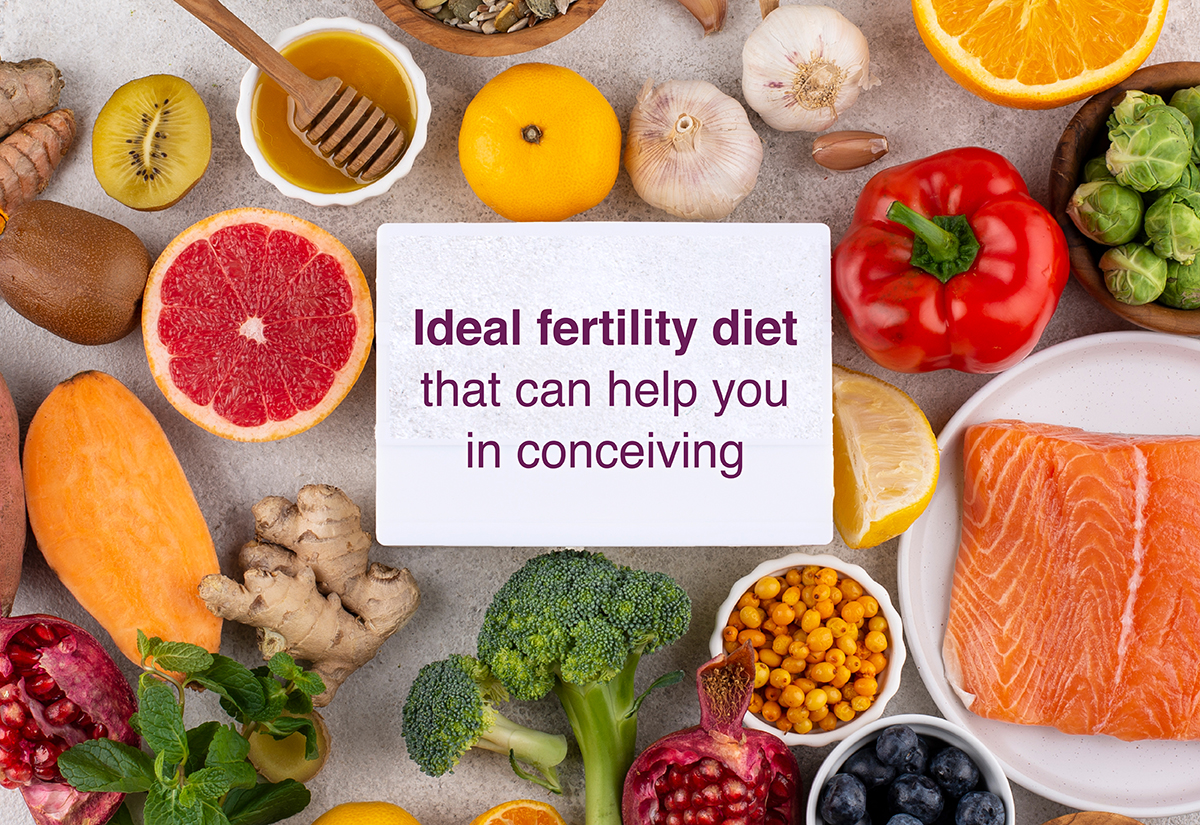Wanting to boost fertility and don’t know where to begin? It is often underestimated that the foods we eat have quite a big role in
Believe it or not, the foods for fertility you eat can play a big role in supporting fertility. A well-rounded, nutrient-loaded diet fuels the body, balances hormones, improves egg quality, and makes it easier for you to conceive.
Let’s learn about simple food choices that pack a powerful punch. From leafy greens to healthy fats and lean proteins, these foods are essential. Let’s see how small tweaks to your plate make a big difference.
Why should you prefer natural foods while trying to conceive?
Several studies show that eating fresh fruits, vegetables, and whole grains improves conception rates for women and semen quality for men. Also, it helps manage weight and lower insulin resistance, two factors closely related to fertility. If you’re trying to conceive, go for a nutrient-packed, whole-food diet that supports your fertility inside out.
Incorporating fertility nutrition shapes your overall well being and is a great way to increase fertility naturally.
Fruits to enjoy while trying for pregnancy
- Watermelon: Known for its high water content, watermelon is excellent for staying hydrated and maintaining electrolyte balance. Proper hydration aids digestion, improves nutrient absorption, and keeps cells functioning optimally—all vital for fertility health.
- Oranges: Packed with vitamin C, oranges are a great choice for immune support and hormone regulation. The antioxidant properties of vitamin C also protect reproductive cells, adding a beneficial boost for those looking to conceive.
- Avocados: With their healthy fats and folate, avocados provide essential nutrients for maternal health and fetal brain development. They’re also rich in potassium, fiber, magnesium, and vitamins B and K, making them a powerhouse for overall fertility.
- Apples: High in fiber, vitamins, and potassium, apples help maintain stable blood sugar levels and support digestive health. These benefits are particularly helpful for women trying to conceive, as balanced blood sugar contributes to hormonal stability.
Adding these fruits to your diet can create a more supportive environment for conception, providing a natural, nutrient-rich fertility diet.
Fruits to limit or avoid while you trying to increase fertility naturally
Pineapple: If you’re on a fertility journey, you might want to press pause on pineapple! This tropical treat, while delicious, contains an enzyme called bromelain that’s known to increase menstrual flow and could even trigger uterine contractions. Think of it as a little too much excitement for your body when you’re trying to conceive! So, while pineapple is a sunny, summery delight, saving it for later might just be a smart choice for moms-to-be. Now you know why this prickly fruit takes a backseat during this special time!
Papaya: Unripe papaya is often avoided by those trying to conceive due to compounds that could potentially interfere with early pregnancy. If you’re actively trying, it’s best to skip papaya to stay on the safe side.
Grapes and Tamarind: Both grapes and tamarind offer great nutrients, but consuming them in moderation is advised. In some traditional practices, they’re thought to increase body heat, so limiting them during this time could be beneficial.
Nutrient-packed food choices that make you more fertile
A fertility-friendly diet goes beyond fruits. Here are other essential foods that can make a difference:
- Leafy greens: Vegetables like spinach, kale, and broccoli are rich in folate, iron, and antioxidants, which support egg quality and overall reproductive health.
- Healthy fats: Omega-3 fatty acids, found in foods like salmon, flaxseeds, and walnuts, are essential for hormone production and reducing inflammation.
- Lean proteins: Protein sources like chicken, beans, and lentils are great for keeping you energized and supporting healthy ovulation and hormone levels.
- Whole grains: Whole grains like brown rice, oats, and quinoa provide complex carbs, which help manage insulin levels and prevent blood sugar spikes, both of which support balanced hormones.
Adding these tasty foods to your diet, along with fertility supplements if needed, can seriously amp up your chances to conceive faster.
Other foods to avoid while trying to conceive:
- Processed or preserved food
- Excessive intake of aerated and caffeinated beverages
- Alcohol and too spicy foods
- Allergenic foods
- Overconsumption of vinegar and pickle
- Seafood rich in mercury, such as tuna and mackerel,
Pregnancy is the most beautiful experience a woman experiences, and for it to be smooth, there is a lot to do, especially while planning for an IVF pregnancy. Keeping up with a balanced nutritious diet contributes to reducing the risk of IVF failure.
Particular attention to IVF planning
Diet becomes even more important for women who are thinking about or actively preparing for IVF. Foods high in nutrients can lower the chance of IVF failure and help establish the ideal environment for conception. Maintaining a healthy, well-balanced diet can greatly increase your chances of getting pregnant and lay the groundwork for a successful pregnancy.
Speak with a fertility expert
Although following the perfect fertility diet might have a significant impact, speaking with a fertility specialist can provide more individualized advice. Contact Ferticity IVF, the top IVF facility in Delhi, for professional guidance. The experts at Ferticity can support you during your reproductive journey and help you determine the optimal dietary strategy for your particular circumstances.
To consult an experienced fertility specialist, reach out to Ferticity IVF, the best IVF centre in Delhi. To book an appointment, log onto https://ferticity.com/best-ivf-doctors-in-delhi.

